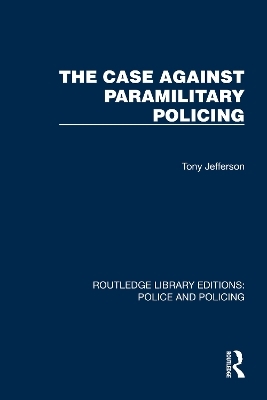
The Case Against Paramilitary Policing
Seiten
2025
Routledge (Verlag)
978-1-032-44901-2 (ISBN)
Routledge (Verlag)
978-1-032-44901-2 (ISBN)
- Noch nicht erschienen (ca. März 2025)
- Versandkostenfrei
- Auch auf Rechnung
- Artikel merken
The argument of this book, originally published in 1990, demonstrates that paramilitarism, thought to deal quickly and effectively with outbreaks of public disorder, far from being maximally effective, substantially contributed to the very problem it claimed to minimize.
In the late 1980s, the conventional wisdom informing the policing of public order events was that of paramilitarism: militarily trained and equipped units with a special responsibility to deal quickly and effectively with outbreaks of disorder. The philosophy behind the paramilitary response suggested that the training, discipline and specialization entailed ensured that the response was maximally effective and most in line with the tradition of ‘impartial policing by consent’. The argument of this book, originally published in 1990, demonstrates the reverse: not only that police impartiality was chimerical and policing by consent was a viewpoint that did not include the consent of the routinely policed: but that paramilitarism, far from being maximally effective, substantially contributed to the very problem it claimed to minimize. The evidence for this argument is drawn from: concrete analyses of a range of public disorder events – political, industrial and social; a comparative look at similar work in USA and Australia; and substantial fieldwork observations and interviews undertaken with a police special patrol group and its supervising officers.
Jefferson argues further that solutions need to be sought for public order policing in making the police politically accountable, ensuring that such accountability is also just (in accordance with the viewpoint of the routinely policed) and in reversing the drift toward paramilitarism.
In the late 1980s, the conventional wisdom informing the policing of public order events was that of paramilitarism: militarily trained and equipped units with a special responsibility to deal quickly and effectively with outbreaks of disorder. The philosophy behind the paramilitary response suggested that the training, discipline and specialization entailed ensured that the response was maximally effective and most in line with the tradition of ‘impartial policing by consent’. The argument of this book, originally published in 1990, demonstrates the reverse: not only that police impartiality was chimerical and policing by consent was a viewpoint that did not include the consent of the routinely policed: but that paramilitarism, far from being maximally effective, substantially contributed to the very problem it claimed to minimize. The evidence for this argument is drawn from: concrete analyses of a range of public disorder events – political, industrial and social; a comparative look at similar work in USA and Australia; and substantial fieldwork observations and interviews undertaken with a police special patrol group and its supervising officers.
Jefferson argues further that solutions need to be sought for public order policing in making the police politically accountable, ensuring that such accountability is also just (in accordance with the viewpoint of the routinely policed) and in reversing the drift toward paramilitarism.
Series Editor’s Introduction. Preface and Acknowledgements. 1. Introduction 2. Minimum Force: A ‘Contingent’ Historical ‘View from Below’ 3. Impartiality, Discretion and the Real World of Policing Disorder 4. Policy, Supervision and the Dominance of the Occupational Dimension 5. Effectiveness or Amplification? The Work Structure in Action 6. Inside the Work Structure: Processes of Amplification 7. General Summary and Concluding Remarks. References. Index.
| Erscheint lt. Verlag | 15.3.2025 |
|---|---|
| Reihe/Serie | Routledge Library Editions: Police and Policing |
| Verlagsort | London |
| Sprache | englisch |
| Maße | 156 x 234 mm |
| Themenwelt | Recht / Steuern ► Strafrecht ► Kriminologie |
| Sozialwissenschaften | |
| ISBN-10 | 1-032-44901-2 / 1032449012 |
| ISBN-13 | 978-1-032-44901-2 / 9781032449012 |
| Zustand | Neuware |
| Haben Sie eine Frage zum Produkt? |
Mehr entdecken
aus dem Bereich
aus dem Bereich
klare Antworten aus erster Hand
Buch | Softcover (2023)
UTB (Verlag)
CHF 27,85


